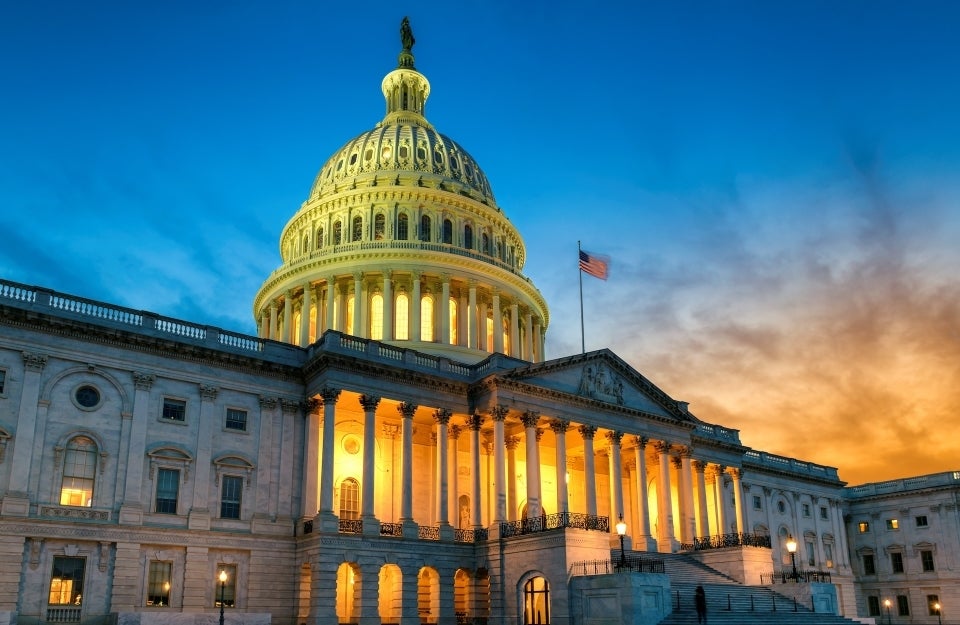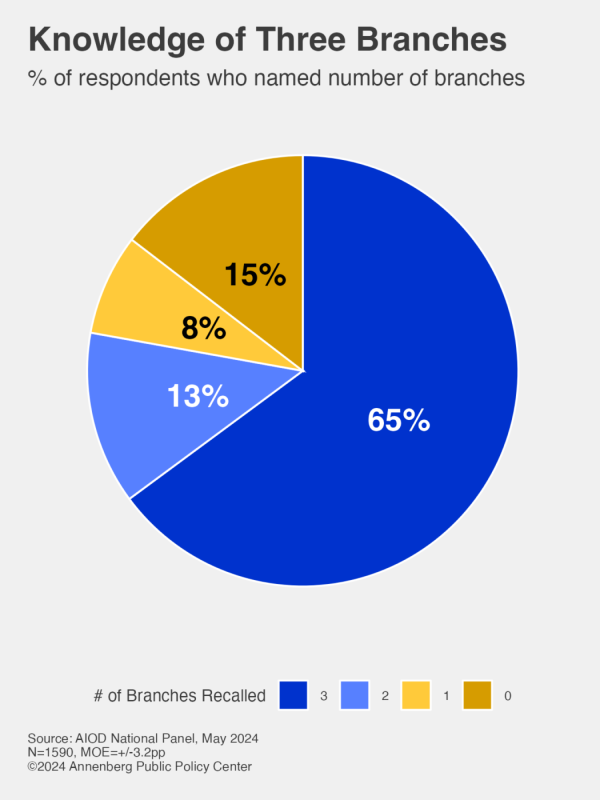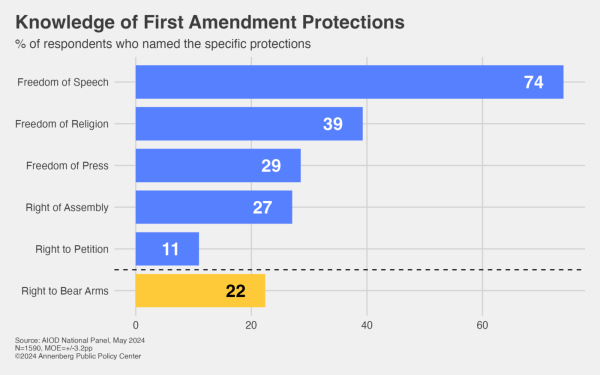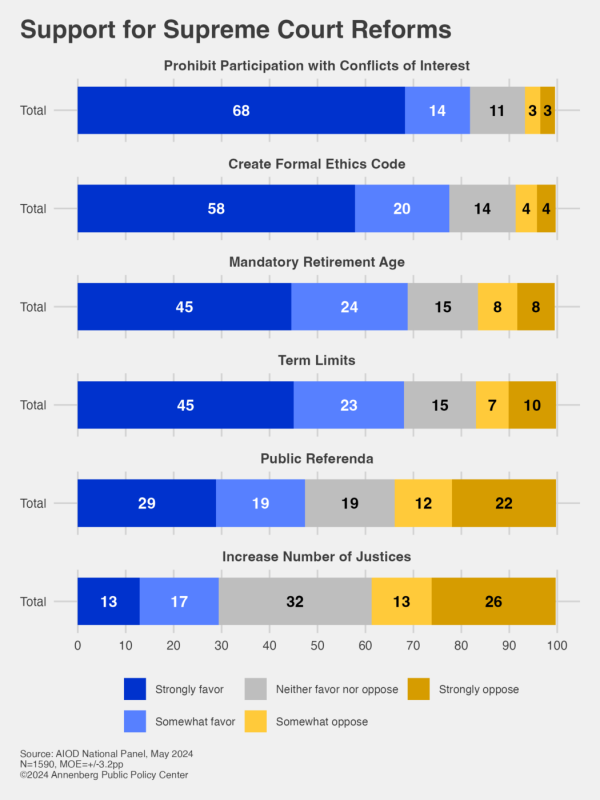A Majority of Americans Can’t Recall Most First Amendment Rights
Most Americans can name only one right guaranteed by the First Amendment, according to the Annenberg Public Policy Center’s 2024 Constitution Day Civics Survey.

Less than half of Americans can name most of the rights protected under the First Amendment and under two-thirds can name the three branches of government, according to the Annenberg Constitution Day Civics Survey, released annually since 2014 by the Annenberg Public Policy Center (APPC) at the University of Pennsylvania
The nationally representative survey, conducted in May 2024 with about 1,600 U.S. adults, finds levels of public knowledge largely unchanged from 2023. As was true last year, most Americans could name only a single right guaranteed by the First Amendment: freedom of speech, provided by nearly 3 in 4 respondents.
The survey also found strong public support for several potential reforms to the U.S. Supreme Court, including term limits, mandatory retirement ages, and prohibiting justices from participating in cases in which they have “personal or financial interests.”
Highlights
The 2024 edition of the Annenberg Constitution Day Civics Survey, released annually to celebrate Constitution Day on September 17, finds that:
- Nearly two-thirds of Americans (65%) can name all three branches of government.
- Asked what specific rights are guaranteed by the First Amendment, nearly three-quarters of respondents (74%) name freedom of speech. The other four rights are recalled by far fewer people: the second most-often cited, freedom of religion, is named by just 39%.
- A little over half of U.S. adults know which party controls the Senate and which controls the House of Representatives.
- Over 80% of Americans support prohibiting Supreme Court justices from participating in cases in which they have “personal or financial interests.” Nearly as many people support creation of a formal ethics code for the court.
“Civics knowledge matters,” says Kathleen Hall Jamieson, director of the Annenberg Public Policy Center. “Those who do not understand the rights protected by the Constitution can neither cherish nor invoke them; those who do not know which party controls the House and Senate may misattribute credit or blame for action or inaction.”
The Branches of Government
Nearly two-thirds of Americans (65%) can name all three branches of government, 13% can name two branches, 8% can name only one, and 15% cannot name any, unchanged from last year.

The First Amendment
Survey respondents were asked if they could name the specific rights guaranteed under the First Amendment. Of those who answered:
- Three-quarters (74%) say freedom of speech
- Under 4 in 10 (39%) say freedom of religion
- Less than a third (29%) say freedom of the press
- Over a quarter (27%) say the right to assembly
- About 1 in 10 (11%) say the right to petition the government
Those responses are consistent with the 2023 survey.
Less than a third of respondents (30%) can name a majority of rights (three or more). Only 7% of respondents can name all five First Amendment rights, while 23% can name three or four, and about half (48%) can name one or two. About 1 in 5 people (21%) cannot name any.
Although 11% correctly say the right to petition the government, twice as many people (22%) incorrectly name the right to bear arms, which instead is protected by the Second Amendment.

Congress and the Supreme Court
While 55% know that Democrats control the Senate, 22% answered incorrectly and another 22% are unsure. While 56% know that Republicans control the House of Representatives, 20% answered incorrectly and 22% are unsure
Knowledge of the Supreme Court
- A 5-4 Supreme Court ruling: Asked what happens after a 5-4 Supreme Court ruling, nearly three-quarters of respondents (73%) correctly say the decision is the law and needs to be followed. Other respondents are split between saying that the decision is sent back to Congress for reconsideration (13%) and the decision is sent back to the federal court of appeals to be decided (13%). This is statistically unchanged from 2023.
- Appointed or elected: Americans overwhelmingly know that Supreme Court justices are appointed (86%), not elected (13%).
- Life terms or fixed terms? Americans broadly know that Supreme Court justices serve a life term (85%), not a set number of years (15%).
- Who decides if the president’s actions are constitutional? If the president and Supreme Court differ on whether an action by the president is constitutional, over half of Americans know (56%) that the Supreme Court has final responsibility for determining this, not the president (5%). But almost 1 in 4 people (23%) think Congress has the final say. This is statistically unchanged from 2023.
Support for Supreme Court Reforms
In the past few years, surveys have shown declining trust and confidence in the U.S. Supreme Court.
The Annenberg Public Policy Center’s Constitution Day Survey has found that from 2019 to 2022, confidence in the Supreme Court plunged 22 percentage points, from 68% to 46%, a finding mirrored in data from other survey firms, including Gallup and Pew.
A paper published this year by APPC researchers in the journal Science Advances, based on APPC surveys, finds that since the court’s June 2022 Dobbs decision – which overturned the half-century-old Roe v. Wade ruling establishing a constitutional right to abortion – public views of the court have strongly reflected political polarization, a dramatic change from the past.
Another article this year by APPC researchers in the journal Judicature, “The withering of public confidence in the courts,” finds a broader decline in trust and confidence in the judiciary as a whole, with the percentage of Americans who say there is a “great deal” or “fair amount” of trust in the judicial branch falling from 75% in 2000 to under 50% in 2022.
The battery of survey questions about court reform was developed under the supervision of University of Pennsylvania political science professor Matt Levendusky, director of the AIOD national panel at the Annenberg Public Policy Center. The analysis and graphics were prepared by APPC research analyst Shawn Patterson Jr.
With this changing environment as a backdrop, the 2024 civics survey asked respondents for their views on measures that have been discussed to reform the Supreme Court. The survey found most Americans support four of six proposals:
- Prohibiting participation of justices with conflicts: 82% support prohibiting justices from participating in cases in which they have personal or financial interests.
- Formal ethics code: 77% support creation of a formal ethics code for Supreme Court justices that allows for justices to be investigated if they are accused of an ethical violation.
- Mandatory retirement age: 69% support requiring justices to retire by a certain age.
- Term limits: 68% support setting a specific number of years for justices to serve instead of granting them lifetime appointments.
- Public referenda: 47% support allowing the public to vote to overturn Supreme Court decisions on controversial issues.
- Increasing the size of the court: 29% support increasing the number of justices on the current nine-member Supreme Court.

How Civics Knowledge and Partisanship Affect Views of Court Reform
There are large partisan differences in support for measures to reform the court. Both Democrats (87%) and Republicans (83%) strongly favor prohibiting justices from taking part in cases in which they have conflicts of interest, but Democrats are significantly more supportive of the other proposed reforms. For instance, the second most popular reform, a formal ethics code, is favored by 88% of Democrats and 70% of Republicans.
Partisanship and civics knowledge are both related to support for reform. Using a civics knowledge scale based on correct responses to the knowledge questions in this survey, the analysis grouped respondents into thirds with high, middle, and low levels of civics knowledge.
The analysis found that people with the lowest level of civics knowledge are less likely to support a measure prohibiting justices from taking part in cases in which they have a conflict – and more likely to support a measure allowing a public vote to overturn a controversial ruling – than those in the highest third of knowledge.


The analysis also found that the relationship between civics knowledge and support for Supreme Court reforms worked differently for Democrats and Republicans: While the most knowledgeable Democrats and independents are slightly more likely to want to reform the court, the most knowledgeable Republicans are considerably less likely to want to reform the court.
“In previous work,” said Patterson, the research analyst, “we were able to show that civics knowledge and support for the Supreme Court began to work differently for Democrats and Republicans following the Dobbs decision. Two years later, we see that this polarization in views toward the court were not short-term fluctuations.”
“This should be extremely worrying for members of the Supreme Court,” Levendusky added. “The court’s independence has long been sustained by its strong bipartisan support in the public. If that vanishes, the court may find itself reformed or constrained in ways that weaken its power.”

Constitution Day
APPC releases the Annenberg Civics Knowledge Survey for Constitution Day, which celebrates the signing of the Constitution on Sept. 17, 1787.
APPC’s initiatives to enhance civics education include Annenberg Classroom, which offers free resources for teaching the Constitution, and the Civics Renewal Network, a coalition of 43 nonpartisan, nonprofit organizations dedicated to improving civics education by providing free, high-quality resources for teachers. Among those resources: CRN’s Constitution Day Toolkit for teachers and an Annenberg Classroom series of a series of award-winning videos, which includes a short film released last month on “The Eighth Amendment: Cruel and Unusual Punishment.”
“This year’s Annenberg Constitution Day Civics Survey reinforces the simple truth that civics education should not focus solely on the country’s youth,” said R. Lance Holbert, director of the center’s Leonore Annenberg Institute for Civics (LAIC), the home of Annenberg Classroom and facilitator of CRN. “Civics education needs to be a life-long pursuit. The education materials provided through Annenberg Classroom and the Civics Renewal Network can aid in building up the nation’s civics knowledge reserves that produce a wide range of direct and indirect benefits.”
As in 2023, the civics survey this year was conducted online rather than by telephone. The administration of the survey is superintended by APPC managing director of survey research Ken Winneg. The survey is funded by an endowment established by the Annenberg Foundation for LAIC.
This year’s online survey was part of the inaugural wave of the Annenberg Institutions of Democracy (AIOD) national panel. Of the total 1,620 respondents, 1,590 pledged not to search for the answers or use other resources for the knowledge items and it is only the smaller group whose responses are included here. Existing literature shows that this pledge is effective at reducing outside information search. To learn more about the 2023 mode shift to an online survey, see our white paper.
This year’s survey was conducted May 1-23, 2024, for APPC by SSRS, an independent research company. The margin of error is ± 3.3 percentage points at the 95% confidence level. See the topline for details.
The Annenberg Public Policy Center was established in 1993 to educate the public and policy makers about communication’s role in advancing public understanding of political, science, and health issues at the local, state, and federal levels.



